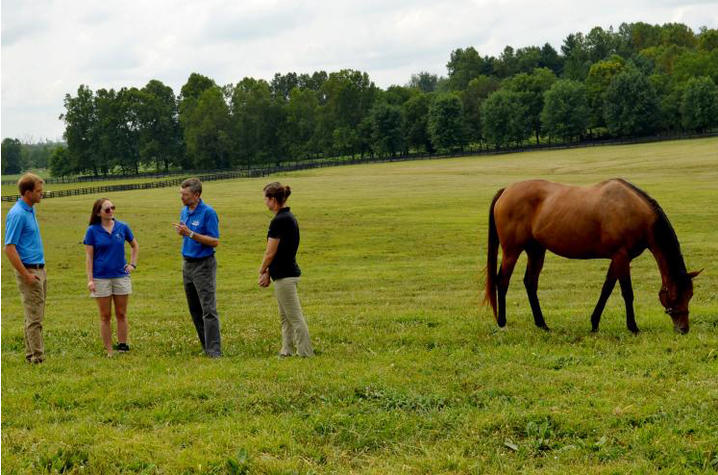Horses and Pastures Bring UK Grads Full Circle
LEXINGTON, Ky. (Sept. 10, 2019) — The University of Kentucky is where Keith and Laura Haag first fell in love with horses, and it’s where they turned to get advice to improve the environment for the horses on Endeavor Farm.
Keith Haag, a 2009 graduate, is the farm manager, and Laura, who graduated in 2010, is the sales coordinator for the Woodford County farm. Since the farm is primarily a commercial breeding operation, they were particularly concerned about the presence of KY 31 tall fescue on the farm. The grass has an endophyte that can cause fescue toxicosis, which can lead to reproductive complications including late-term abortions in mares. They were also interested in general pasture improvements.
“We want to provide the horses that are on this property with the best pasture that we possibly can,” Keith Haag said. “Our clients spend a lot of money to keep their horses here, and they expect a very high level of care in return. Part of that is providing their horses with good pastures.”
The Haags learned about the Horse Pasture Evaluation Program while undergraduates at UK. Both developed their love of horses as student workers at UK’s Maine Chance Farm and consider Laurie Lawrence, UK equine professor in the College of Agriculture, Food and Environment, one of their mentors.
“Dr. Lawrence was always preaching the benefits of pasture maintenance and really drilled it into us how important our pastures are to the health and well-being of our horses,” Keith Haag said. “Our pastures are the most important resource that we have on this farm.”
In fall 2018, the Haags began working on pasture evaluation and improvements with Ray Smith, UK forage extension specialist, and Krista Lea, program coordinator, who was also a former classmate.
“Often farms initially contact us because they have broodmares, and they are worried about the reproductive issues that can arise because of tall fescue, but they often find out a lot of other things about their pastures, like ways to fill in bare spaces and weeds they can control,” Smith said. “So many of our clients call us back, not because of the fescue, but because they are interested in weed management, new grasses to plant and general pasture rotation.”
Through the program, the Haags were able to get a detailed evaluation of the forage composition of the pastures on the entire farm. They began implementing improvements as soon as they received the results.
“They have been so eager for information,” Lea said. “We’ve talked about all different kinds of things from installing dry lots to purchasing hay feeders to improve feed utilization during the wintertime. They are willing to adopt new things. They ask questions to make sure it’s safe and worth their money, but they are very willing to adopt new things not typically seen on horse farms, like electric fencing.”
The electric fence allowed the Haags to renovate an area of a field without moving the horses completely off it.
“It was a ‘hold your breath’ moment after we put it in, but the horses handled it fine,” Laura Haag said. “We are very confident that we can use it as a way to do rotational grazing in our paddocks and pastures going forward.”
The Haags have been pleased with the results and plan to continue using the program.
“We have noticed changes already,” Keith Haag said. “Before, we were just kind of throwing darts at a dart board and really hoping they would stick. Now, we have a much better idea of what we need to be doing and when we need to be doing it. There were some really simple things we could do to improve the quality of our pastures.”
In addition to the Horse Pasture Evaluation Program, UK offers many avenues for equine and other livestock producers to learn about pasture improvements, including extension publications that cover basic pasture management. They are available online at https://forages.ca.uky.edu/foragepublications. Agriculture and natural resource agents with the UK Cooperative Extension Service can provide pasture improvement advice to local producers at the farm level. To view the video, please click here.





